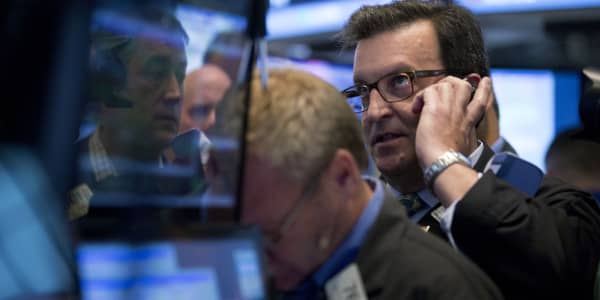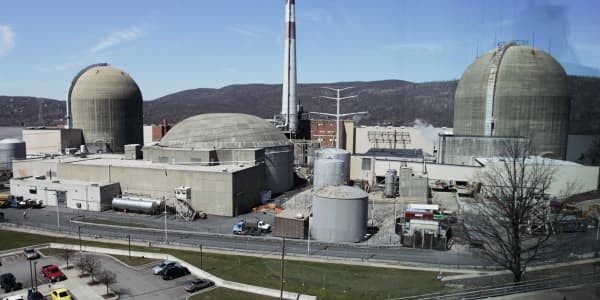Last week, Chesapeake Energy made its second big cut in capital spending in the last month, highlighting the grinding toll that low oil and gas prices are taking on energy stocks—and how tough it will be for them to climb back from lows, especially the companies with significant debt loads. But there's still one big Chesapeake believer out there: Carl Icahn.
No one will be watching where Chesapeake Energy shares go from their current 52-week-low level more closely than Icahn. The famed activist has an ownership stake that now reaches roughly 11 percent of the controversial energy company's shares.
Is Carl Icahn already in too deep with Chesapeake Energy, or will his patience be rewarded?
Between May 2012 and November 2012, Icahn unveiled a huge Chesapeake Energy stake. Last week, Icahn raised that stake to above 13 million shares—it was the first time Icahn added to his Chesapeake stake in two years.
Icahn seems to like Chesapeake best when the company's shares are trading as if, in a worst-case scenario, it could go bankrupt.
After dabbling in the stock in 2010 and 2011, Icahn's big bet on Chesapeake Energy was made in 2012 as it faced extreme fire over the management of its then-CEO Aubrey McClendon for his aggressive approach to running the company—its balance sheet had more debt than Exxon Mobil, a company 32 times its size. There were serious concerns about the company's ability to pay off its debt, and natural gas prices had also bottomed out in 2012, adding to the highly levered company's challenges.
Chesapeake shares rallied hugely from a 2012 low of roughly $14 to as much as $31 in June 2014, but Icahn didn't sell. That was unlike another big turnaround bet he made in 2012, on Netflix, which rallied so quickly and sharply, Icahn booked an $800 million profit.
Icahn has stayed in Chesapeake, letting a more-than-doubling in the stock from its 2012 low to its 2014 high of $31.49 pass him taking a similar rally profit. That's not a trigger-happy activist approach to making money, and it also has not paid off: In recent trading, Chesapeake has dipped even lower than its 2012 bottom.
Icahn and Southeastern Asset Management, a long-time Chesapeake shareholder, are neck-and-neck as the company's largest investors as of March 31, at 11 percent and 11.1 percent respectively.
So what does Icahn—whose staff did not return a call seeking comment—still see in the bull vs. bear battle over Chesapeake?
The bull-bear divide over Chesapeake
The problem of a plunging price of natural gas has returned—nat gas has dropped to less than $2.70 per million British Thermal Units of energy from $6 last year (it went as low as $1.99 in 2012). Chesapeake often gets even less than market price because many of its deposits are in parts of the U.S. where there is little available pipeline capacity, weakening its bargaining position, said SunTrust Robinson Humphrey analyst Neal Dingmann.
Dingmann, an advocate for an investment in Chesapeake, isn't necessarily vociferous about it.
"I'm not saying they're the best," Dingmann said of his buy rating. "I'm saying they have ample liquidity, and they will be all right if natural gas prices stabilize.''
The 2012 argument was about whether Chesapeake could sell off enough assets to stave off bankruptcy. Asset sales since 2012 gave investors confidence about Chesapeake's ability to clean up its balance sheet. Chesapeake bears still think the company will run out of assets to sell, while bulls believe that Chesapeake could get to cash-flow break-even quickly, even if commodity prices stay at current levels.
They [were] going to have almost $2 billion [of negative cash flow] this year, to generate only modest growth in production. The $4 billion credit line could have been used to make a transformational acquisition, but their balance sheet will be under pressure, so they have to hold on to that cash.Tim RezvanSterne, Agee & Leach analyst
Cash has been draining faster than expected, forcing Chesapeake shares lower.
Prices are so low that Chesapeake could be forced to blow through a big chunk of the $8 billion cushion of cash and credit it had built up last year, even though it has already been slashing spending.
A report last week from RBC Capital Markets estimated that the company will end the year with $6 billion of cash and credit, reflecting a $4 billion credit line it took out in December and $2 billion remaining from the $4.975 billion it got from selling reserves in the Marcellus Shale and Utica Shale last fall.
"They [were] going to have almost $2 billion [of negative cash flow] this year, to generate only modest growth in production," Sterne, Agee & Leach analyst Tim Rezvan said Monday. "The $4 billion credit line could have been used to make a transformational acquisition, but their balance sheet will be under pressure, so they have to hold on to that cash.''
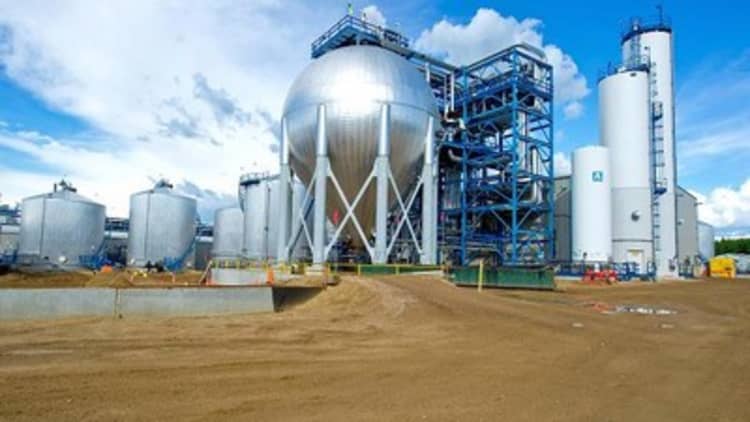
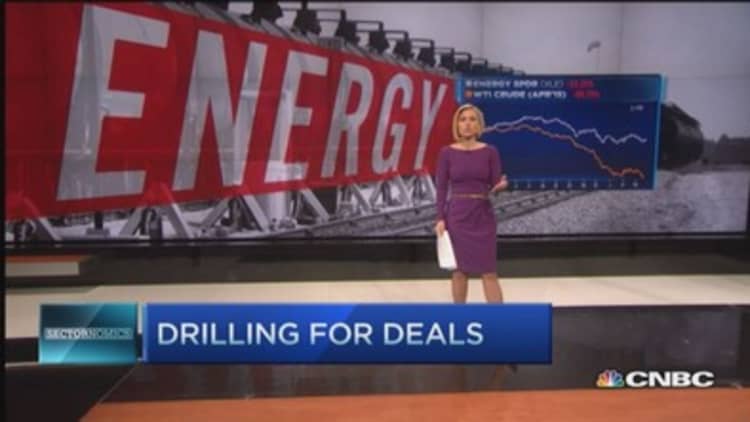
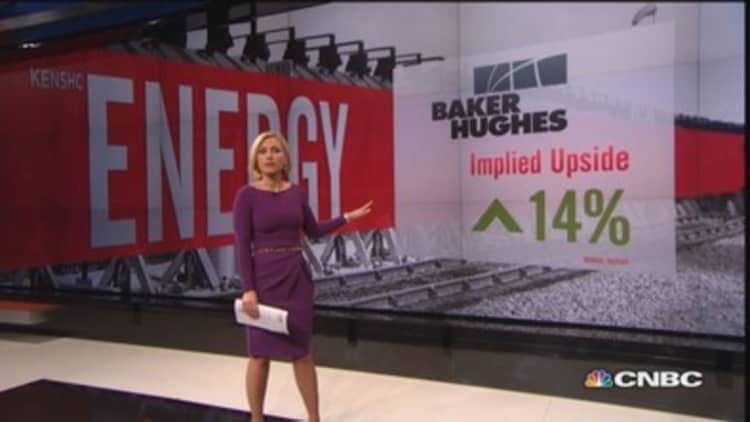
Nothing about the situation is yet an existential threat to Chesapeake, since it has so much cash available if it draws on the credit line. Bond rating agencies rate Chesapeake's paper one notch below investment grade.
But nothing about it is going to improve much, either, until the prices of oil and gas pick up.
That's what led the Oklahoma City-based oil-and-gas driller to announce last week it would cut its capital expenditures budget for this year by another $500 million, to $3.5 billion to $4 billion. That follows the Feb. 25 guidance that it would cut so-called capex by almost $1.6 billion, or 26 percent, from 2014 levels that were slashed 23 percent from 2013.
Goldman Sachs analyst Brian Singer, who rates the stock a buy, recently wrote that the company's new move is based on having fewer drilling rigs in the field, but he doesn't add any new information about Chesapeake's ongoing push to spend less on each rig it does have.
The "Street now expects 2015 negative free cash to be wider [than] three months ago," Singer said. "While this capex cut should help narrow expectations, ultimately favorable impact from incrementally lower costs (as opposed to simply lower activity) may be needed."
Read MoreWarren Buffett's climate-change leadership challenge
The company has done an effective job of cutting costs since CEO Robert D. (Doug) Lawler took over in June 2013, Dingmann said. But it remains hamstrung by some quirks in company contracts, including onerous pipeline contracts McClendon negotiated, which require Chesapeake to pump gas at a loss in parts of Louisiana and Texas to avoid penalties.
Chesapeake has also used unconventional hedges against natural gas price declines, called "three-way collars," which left them more exposed than traditional hedges would have.
"A large part of 2015 earnings will be driven by hedges they have in place," Rezvan explained. In a recent report, he noted that the cut in capital spending may also slow 2016 production growth.
What a real rebound will require
In announcing the new plan, Chesapeake said it hoped to be cash-flow neutral by the end of this year.
"If gas prices stabilize, and I have them stabilizing, my model shows that their [negative cash flow] this year will be a few million dollars," Dingmann said.
Dingmann's analysis assumes that natural gas commands about $2.95 per million BTUs by the end of this year and $3.12 next year, with oil staying around $50 per barrel this year and $53 in 2016. If that happens, then the company can keep earnings before interest, taxes and non-cash charges between $3.5 billion and $4 billion each year, though it would still run a deficit after capital spending is included, he said.
Read MoreThe latest energy MLP fund, launched at the bottom
But a real rebound in Chesapeake shares is likely to require more than what the company announced.
"Four-dollar gas would help a lot," Rezvan said. Then he added, "A return to $80-a-barrel oil would be impactful, too."
Chesapeake shares have fallen 39 percent in the last year, falling in between the decline in large-cap energy, down by roughly 25 percent, and the small-cap energy stocks, which are down by roughly half.
The low prices have put pressure on Chesapeake's strategy, which like many drillers calls for spending more on drilling new wells than the company generates in operating cash flow each year. The resulting deficit in free cash flow—or operating cash minus capital investment—was at risk of getting untenably large. That's why some analysts, like Rezvan, have been telling investors to consider Chesapeake a sector "underperformer" both before and after the latest Chesapeake spending-cut announcement.
But we know at least one noted investor wasn't listening—when it comes to Chesapeake, Icahn continues to buy into the bullish story, especially when it's at a bottom.
"Guys like Icahn, traditionally with an activist bent, are establishing more sizable positions in some oil and gas stocks," Dingmann said. The SunTrust analyst said it was surprising, to some extent, that Icahn never took any money off the table when the stock more than doubled from 2012 to 2014, but it could simply be an indication he believes that Chesapeake's far-flung acreage is still worth more than the $32 high share price in 2014, and that the current macro situation will not create a long-term valuation readjustment downward in acreage value.
In the two year period, new CEO Lawler did make some large transactions, including the $5 billion sales of assets to Southwestern Energy, so as the stock was rising Chesapeake was also making some moves to get its house in order, and there was less reason to be a vocal activist. Of course, the crash in oil and decline in natural gas has made those gains disappear quickly, but the macro might not change the underlying thesis of an investor like Icahn. Dingmann also noted that even though Chesapeake has made a significant effort to increase the oil component of its overall production, it is still significantly levered to natural gas. "There aren't too many bullish natural gas investors today, but to add to a position like this, I have to think Icahn is one of them," Dingmann said.
—By Tim Mullaney, special to CNBC.com



